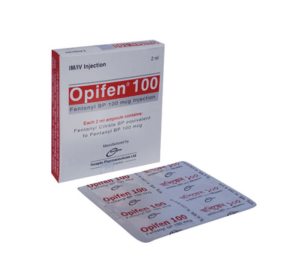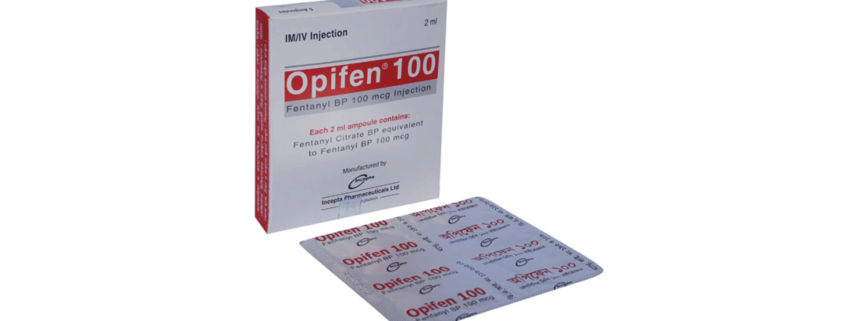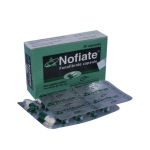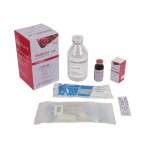Opifen Injection(Fentanyl Citrate)

Therapeutic Group: Analgesic, Anti Inflammatory
Presentation
Opifen 100 Injection: Each 2 ml ampoule contains Fentanyl Citrate BP equivalent to Fentanyl BP 100 mcg.
Description
Fentanyl is a potent narcotic analgesic with a rapid onset and short duration of action. The principal actions of therapeutic value are analgesia and sedation. The action of Fentanyl is qualitatively similar to those of Morphine and Pethidine, i.e. analgesia, euphoria, miosis, bradycardia, respiratory depression, bronchoconstriction, muscle rigidity and suppression of cough reflexes.
Indications
Fentanyl is indicated for:
analgesic action of short duration during anaesthetic periods, premedication, induction & maintenance and in the immediate post-operative period as the need arises
as a narcotic analgesic supplement in general and regional anaesthesia
administration with a neuroleptic injection as an anaesthetic premedication, for the induction of anaesthesia and as an adjunct in the maintenance of general and regional anaesthesia.
Dosage & Administration
Adult dose-
Premedication: 50 to 100 mcg IM 30 to 60 minutes prior to surgery.
Adjunct to general anaesthesia: Induction: 50-100 mcg initially IV and may be repeated at 2 to 3 minute intervals until the desired effect is achieved.
Maintenance: 25-50 mcg IV or IM
Adjunct to regional anaesthesia: 50-100 mcg IM or slowly IV when additional analgesia is required.
Post-operatively: 50-100 mcg IM for the control of pain, tachypnoea, and emergence delirium. The dose may be repeated in one or two hours as needed.
Children dose-
For induction and maintenance in children (2-12 years of age), a reduced dose as low as 20-30 mcg/10 kg is recommended.
Side Effects
As with other narcotic analgesics, the most common serious adverse reactions reported to occur with Fentanyl are respiratory depression, apnoea, muscular rigidity, and bradycardia.
Precautions
Opioid analgesics impair the mental and physical ability for potentially dangerous tasks (e.g., driving a car or operating machinery). Patients taking Fentanyl should be warned of these dangers. The use of concomitant CNS active drugs requires special patient care and observation.
Use in Pregnancy & Lactation
Pregnancy: There is no adequate and well-controlled study in pregnant women. Fentanyl should be used during pregnancy only if the potential benefit justifies the potential risk to the fetus.
Lactation: Fentanyl is excreted in human milk. Therefore, Fentanyl should not be used in nursing women because of the possibility of sedation and respiratory depression in their infants.
Drug Interaction
Co-administration of the following drugs may enhance or prolong the effects of Fentanyl- azole antifungals, macrolide antibiotics etc.. CNS depressant drugs may have additive or potentiating effects with Fentanyl.
Over Dose
In sufficient overdosage, Fentanyl would produce narcosis, marked skeletal muscle rigidity. Cardio-respiratory depression and cyanosis may also occur. In the presence of hypoventilation or apnoea, oxygen should be administered and respiration should be assisted. A specific narcotic antagonist, such as naloxone, should be available for use as indicated to manage respiratory depression.
Commercial Pack
Opifen 100 Injection: Each box contains 5 ampoules of 2 ml.



